
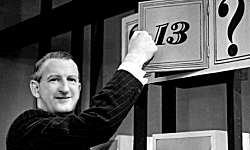

|
 |
|
 |
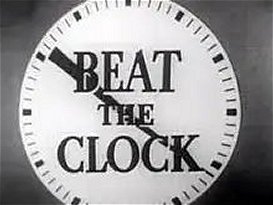 |
Arguably, Britain's
first television quiz celebrity was Ted Moult, a former 'Brain of Britain'
contestant who became a regular member of the resident team of quiz experts
on the BBC programme 'Ask Me Another'. When ITV started in 1955, they
had more money to spend on quiz show prizes compared to the BBC. Their
first quiz show to be aired was 'Take Your Pick' with Michael Miles which
ran until 1968 when Rediffusion lost their franchise. From 1969, Michael
then went on to present 'Wheel of Fortune' for Southern TV until he died
in 1971. Another show popular at the same time was 'Double Your Money' hosted by Hughie Green, again for Rediffusion, until 1968. Hughie then went on to present 'The Sky's The Limit', assisted by Monica Rose and Maxine Turner, for Yorkshire TV in the 1970s. In the early 1960s there was an investigation into the broadcasting industry following corruption and cheating allegations in the United States prompted by an investigation into one of their shows. Additionally, there was a review into broadcasting issues carried out by the Pilkington Committee who produced a report in 1962 entitled 'The Future of Sound Radio and Television'. This created problems for ITV as there followed a restriction on prize money. As a result, two shows began in this era, neither of which had any monetary prizes: 'University Challenge' and a spin-off 'Sixth Form Challenge'. The latter was produced to rival 'Top of the Form' that was being shown on the BBC at that time. Another quiz that started then was 'Quiz Ball', hosted by David Vine who went on to host 'A Question of Sport' in 1970. During the Sixties many other shows had quiz / prize segments within them, some of which went on to become shows in their own right, but were otherwise usually general entertainment shows such as the 'Beat The Clock' segment in 'Sunday Night at The London Palladium' and the classic 'Double or Drop' game in 'Crackerjack!' where you lost if you got 3 cabbages or dropped the prizes! |
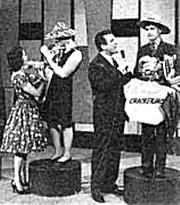 |
| The
Auction Game A game show devised by Bamber Gascoigne that was hosted by Jimmy Edwards where four celebrities 'bid' for the right to answer questions. Seven episodes were made by LWT for ITV, shown from 11th August 1968 to 22nd September 1968. All About You Presented by Barry Westwood and produced by Elkan Allan for Associated-Rediffusion in 1966. A 30-minute black and white show in which viewers were asked questions on a different theme each week, tying in with results of various 'gallup' polls. Ask Me Another A 30-minute BBC show from 1962, in black and white. A general knowledge quiz, hosted by Franklin Engelmann, where a regular 'resident' team, which included Ted Moult, Olive Stephens and Reginald Webster, took on a team of 'challengers'. |
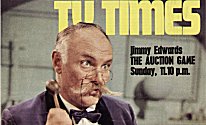 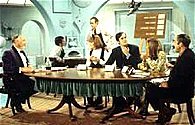 |
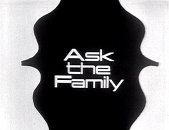 |
Ask
The Family Literally a 'family' quiz show created by Patricia Owtram. In the original series 275 x 30-minute episodes were broadcast by the BBC from 12th June 1967 to 22nd October 1984. Two family teams consisting of mum, dad, one older and one younger kid faced brain-teasing puzzles and questions from host Robert Robinson. In various rounds, the teams were asked questions directed at only certain members of the family, such as 'children only' or 'mother and younger child only'. Played on a 'knockout' basis, each series ended with a grand final between the two undefeated families. The theme music is 'Sun Ride' by cimbalom player John Leach who provided music for many series and films such as 'The Quiller Memorandum' and 'The Ipcress File'. Abracadabra Produced by Associated-Rediffusion for ITV this show was transmitted from 20th July 1961 to 6th September 1962. As were many television game shows of this period, the show was created by Roy Ward Dixon, who also presented the show along with Gaynor Jones and his wife Shirley. Contestants were required to answer questions to win letters with which they could make up words to win prizes of up to £125. One feature of the show was a goldfish bowl filled with coins from which contestants tried to remove as much as they could in one handful. Many were frustrated by their own greed when they discovered that a full fistful of coins was too big to get out through the neck of the bowl. |
|
Television
Brain of Britain Created by John P.Wynn, a prolific game inventor, this was one of the longest-running radio quiz competions (BBC Light Programme 1953-1967, BBC Radio 2 1968-1969, BBC Radio 4 1970 onwards). It began as a slot in 'What Do You Know?' in 1953 in which the main part of the show was the quiz itself, originally called 'Ask Me Another'. It was chaired on radio by Franklin Engelmann until his death in 1972 and later Robert Robinson (1973 - 2008). It briefly became a BBC1 television programme from August 1969 to January 1970 when the BBC held regional qualifying heats followed by a national series from 20th September. Four contestants competed against each other in each episode, taking turns alphabetically by surname. Each contestant in turn was asked a question. If a correct answer was received within 10 seconds they were awarded a point and control of the next question. An incorrect answer ended the contestant's turn and the question was then offered to the others in a race aqainst a silent buzzer. No matter who answered correctly, the next question would go to the next alphabetical contestant. If correct answers were received to five consecutive questions a bonus point was awarded and control passed to the next contestant. One question for each contestant was also based on a sound clip. After a series of heats, normally 12, the heat winners plus the four highest scoring runners-up entered a round of four semi-finals with the winner of each making it to the Grand Final to decide the champion. Hosted by Harvey Hall, it only ran the one time but producer Bill Wright had another idea for a national quiz contest which eventually became 'Mastermind'. |
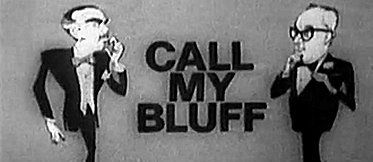 |
The
Brains Trust Shown on BBC1 September 4th 1955 - 1961 this was a black and white production of a popular radio show created by Howard Thomas transferred to TV. Question masters included Norman Fisher, Alan Melville, Bernard Braden and Michael Flanders. A panel of allegedly 'clever' celebrities gave spontaneous 'off the cuff' answers to (mainly) current affairs questions . Call My Bluff A BBC panel game show that was based on a short-lived US version of the same name created by Mark Goodson and Bill Todman. The 30-minute episodes were first transmitted on October 17th 1965 and the original version of the series ran until 22nd December 1988. It was originally hosted by Robin Ray 1965 – 1966 then Joe Melia 1966 – 1967, Peter Wheeler 1967 and most famously by Robert Robinson1967 – 1988. Two teams of three celebrities took turns in each member reading out a definition (only one of the three being true) of a bizarre word from the Oxford English dictionary in a fashion designed to 'bluff' the opposition into picking the wrong definition as being correct. The humorous banter, particularly between the captains, was completely unscripted. The original team captains were Frank Muir and Robert Morley. Morley was succeeded by Patrick Campbell and Arthur Marshall took over in 1981 following Campbell's death. Various celebrities also occasionally stood in as team captains including Alan Melville, Kenneth Horne and Kenneth Williams. The theme music for the show was 'Ciccolino' by Norrie Paramor. |
| The
Celebrity Game A 30-minute black and white UK version of an American show. Associated-Rediffusion made 14 episodes transmitted by ITV from 2nd June to 11th September 1964. Devised by Merill Heatter and Robert Quigley, the show was hosted by Clive Goodwin and directed by Marc Miller. A celebrity panel game show in which three contestants predicted how nine celebrities would answer 'yes or no' to questions provided by viewers and the general public. Concentration Based on a US show where contestants had to remember where two identical cards were positioned on a large board. Made by Granada, the UK game show originally aired from 16th June 1959 to 7th June 1960 and was initially hosted by DJ David Gell, who shared the hosting with Chris Howland later in the series. It was revived by TVS on the ITV network in the 1980s. Two contestants were faced with a game board divided up into 30 numbered squares. Behind each square was part of a rebus (pictures and/or symbols that made up a word or phrase), a named prize or a 'special action' square. The first contestant called out two numbers. If the prizes or special action behind the numbers did not match, or the second number was not called out within a certain time limit, that contestant's turn ended and the opponent took a turn. However, if the contestant did manage to find matches in the squares, that prize was placed on a board behind the contestant or he/she could perform the action indicated. Successfully removing the numbers also revealed two bits of the rebus. The contestant could try to solve the puzzle by making one guess. There was no penalty for a wrong guess and the contestant kept control until they failed to match up two squares. It was more common for the puzzle to be solved after quite a few of the squares had been revealed and rarely with only a few clues showing. A 'special squares wild card' provided the player with an automatic match. When this happened, a wild card match was made resulting in three puzzle parts being revealed. In 1959, each winner played up to three games. In December, the limit decreased to two. Each losing player received £10. In a bonus round, 'Global Game', was played for one of eight holidays. The contestant was faced with a board of 15 numbered panels. Seven of the eight holidays behind the panels had matching pairs, the eighth being a decoy. Contestants were given 50 seconds (45 in the later series) to match the pairs and, if successful, won the holiday revealed by the last pair matched. |
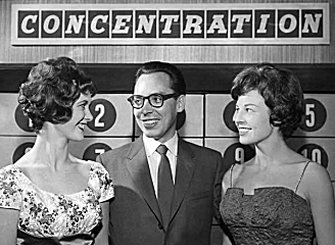 |
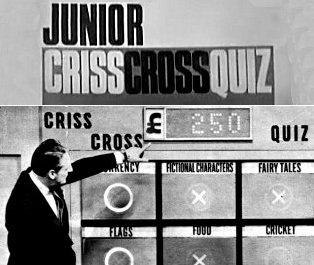 |
Criss
Cross Quiz and Junior Criss
Cross Quiz Produced by Granada for ITV, the show was based on noughts and crosses and was imported from America where Jack Berry and Dan Enright's creation was called 'Tic Tac Dough'. 342 30-minute episodes were made and it was shown three times weekly from 17th June 1957 until 22nd September 1967. The game was played on a grid of nine squares with two contestants having to answer a question correctly to put a nought or a cross in a square, the aim being to get three noughts or three crosses in a row either horizontally, vertically or diagonally to win the game. An incorrect answer put your opponent’s symbol in the square. Questions were asked from such diverse categories as Quotations, Nicknames, The 1920s, Africa, Films, Currency and there was also a 'Pot Luck' option. Each correct answer on the outer squares would win £10 with the centre square being worth £20. In a drawn game the prize money would be doubled for the next game. Winners continued to play on the show until they were beaten, adding their winnings to a total after each game. Prizes were huge by the standards of the time and Rodney Challis Sowerby was the first contestant to win a four figure amount, taking home £2020 in December 1957. In March 1958 Rushworth Fogg of Glasgow beat 16 challengers through seven episodes to win £2360 - an amount that was then around three years' earnings for the average worker. After that year's summer break, a rule capping the maximum amount a contestant could win to £1000 was introduced by the producers. The show was initially hosted by Jeremy Hawk who had a long career in music halls and London’s West End stages. He had also appeared on television as a straight man to comedians Benny Hill, Arthur Askey and Norman Wisdom. When he left the show in 1962 he was replaced first by Bill Grundy and then by Canadian-born Barbara Kelly who was probably best-known as being a regular panellist of 'What’s My Line?'. A junior version was also produced, starting the same year as the adult version, although the contestants played for hobby-related prizes instead of cash. Predictably called 'Junior Criss Cross Quiz' it ran for 391 episodes between 1957 and 1967. Questions for this show were edited and verified by Newnes' Pictorial Knowledge. Presenters on the children’s version were Jeremy Hawk , Chris Kelly, Bob Holness, Mike Sarne, Chris Howland, Gordon Luck, Peter Wheeler, Bill Grundy, Danny Blanchflower and Barbara Kelly. The show also had its oddities with live animals occasionally being offered as prizes. Fish, budgies and even a pedigree dog were all given away during the first year! One contestant, a lad from Wilmslow called Jeremy Purser, won consecutive matches for week after week until they made him retire, asking him to give the wrong answer to a question, |
| Don't
Say A Word Associated-Rediffusion produced 29 episodes of this 30-minute show over 2 seasons from June 13th 1963 to 25th December 1964. This early version of 'Give Us A Clue' was a charade game show created by Mike Stokey and directed by Robert Fleming and Daphne Shadwell. Two regular teams consisting of Kenneth Connor, Una Stubbs and Glen Mason against Harry Fowler, Jill Browne and Libby Morris mimed away with many very famous guests. The show was hosted by Ronan O'Casey, with Dick Norton announcing and Douglas Eales keeping the score. Double Your Money This famous 30-minute quiz competition with the catchy intro music started life in a different format as a radio show, originally broadcast on Radio Luxembourg since 1950 which in turn was based on the American radio quiz 'Take It Or Leave It' that ran from 1940 to 1947. The British game show first came to screen on ITV on 26th September 1955, just a few days after the first broadcasts from the commercial channel. It was produced by Associated-Rediffusion until 1964 and then by Rediffusion London and it finished in 1968 when the company lost its franchise and 480 episodes of 30 minutes were made of this show, created by John Beard, before its demise on 22nd July 1968. Throughout its life the programme was consistently one of the most popular on British television. The quiz was hosted by Hughie Green and hostesses on the show included 18 year-old Valerie Drew and an elderly cleaner named Alice Earley who was taken on by Green after first appearing as a contestant. Others were Nancy Roberts 1961–1965, Julie de Marco 1963–1965, Audrey Graham 1966-1968 and Monica Rose 1963–1968. Hughie and Monica released a 45rpm single titled 'Clap Your Hands' in 1966. In addition, the show airing on 8th November 1966 came from The House of Friendship, Moscow, Russia, where Monica Rose and Natasha Vasylyeva were hostesses. The general knowledge quiz format of the show was similar to 'The $64,000 Question', with prize money doubling after each correct answer from £1 to a guaranteed amount of £32 with multi-part answers being required in the harder stages. When a contestant correctly answered the three-part question to reach the '£1,000 Treasure Trail' they were placed in a sound-proof 'isolation booth', where the cooling fans were turned off and the temperature slowly grew, potentially making contestants look sweaty and nervous. |
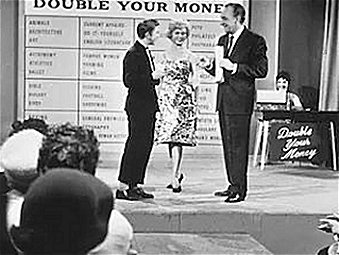 |
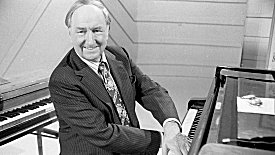 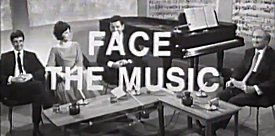
|
Exit!
It's the Way-Out This was a British television game show produced by Associated-Rediffusion that first aired on 28th September 1967. The show only ran for 13 episodes plus the pilot show, all of which are believed to be lost. It was compered by disc jockey Ed Stewart with hostesses Lesley Judd and Jane Tucker. More or less a straight forward quiz show, Reading Evening Post television critic Chris Reynolds said Ed Stewart "makes the contestants feel at ease within seconds and proceeds to zip through the questions like a scalded cat" and praised it as "a pleasant enough way to start the evening, even though the questions are ridiculously simple". Further criticism of the quality of the questions came from Milton Shulman of the Evening Standard who wrote, "It is difficult to define what this show is supposed to be doing unless it is aimed at being an indictment of the British educational system or a glorification of ignorance as a way of life. Week after week young people in their late teens or early twenties are asked to play a game which involves answering questions aimed exclusively at the moron belt". "The compere commiserates feelingly with all those who can't answer, assuring them that he would do as badly if he were in their shoes and patting them on the back when they admit they never read the newspapers". Face the Music A British classical music panel game show created by Walter Todds, adapted from a radio format, that originally aired on BBC2 on 26th December 1966 as a 'Christmas Special' pilot show. It then ran as a sporadic series from 3rd August 1967 to 25th December 1979 with Joseph Cooper hosting the entire run. Subsequently it was moved to BBC1 from 17th April 1983 to 16th December 1984. At it's height the programme had a weekly audience of over 4 million. The theme music for the show was 'The Popular Song' from 'Façade - An Entertainment' by Sir William Walton, who also appeared as a guest on the show in 1972. Apparently 63 episodes have survived in the archives, but only 11 from the first six series survive. The programme took the form of a quiz, but without any scoring or particular winner. A panel of three celebrities would be joined each week by a special 'musical' guest, who would also provide anecdotes regarding their lives and professional careers. Questions were asked in a series of rounds, each with a theme, including such as 'The Face, The Music', where the panel would have to identify a composer from their picture, as well as the composer of the music played along with it. 'Hidden Melody' was a round where Joseph Cooper would perform a popular tune in the style of a famous composer, while also including extracts of works by that composer to help listeners. In an 'Opera' round the panel were shown a filmed performance of one opera with the soundtrack of a different one, and asked to identify both. In a round called 'The Dummy Keyboard', Cooper would play a famous piece on a soundless piano, asking the panel to identify it from his hand movements alone. For the benefit of television audiences the music in question would be slowly faded in. Regular panellists included Robin Ray, David Attenborough, Joyce Grenfell, Bernard Levin, Patrick Moore, Michael Bentine and newscaster Richard Baker. |
|
First
Impressions A short-lived panel game, based on the American show 'Your First Impression', was first aired on BBC1 on 27th October 1964. A mystery celebrity guest was placed in a soundproof box out of view of the panel of three other celebrities who were then shown pictures of five 'possibilities' as to the identity of the person in the box. The panel asked questions of the mystery guest in the form of sentences to be completed such as "If I locked myself out of my house I would..........". These were answered through a headset to the chairman, Terence Brady, and he repeated the answer to the panel so that no 'voice clue' could be gained from the answer. After a set period of time the panel were allowed 30 seconds to consider the answers received and then had to vote for one of the five 'possibilities' and giving the reasons for their choice. During this, the identity of the mystery guest was revealed to the audience. The mystery guest then came out to reveal their identity and discuss the answers given with the panel members. Each programme had three celebrity guests, the people in the first episode being A.J.P Taylor, Diana Dors and tv writer John Watt. For Love or Money In June 1959, ABC Productions produced a British version of the US show 'For Love or Money' for ITV. It ran for four seasons,93 episodes of 30 minutes, until 1961 and its hosts included Keith Fordyce, Bob Monkhouse, Dickie Henderson, and Des O'Connor. The format was much the same as the American version, except that the board displayed a string of four 9s and the decimal point was replaced with a 'flying shilling' sign, meaning contestants could win anywhere from 9/- to 9,999/- (about £500). The US CBS show, hosted by Bill Nimmo, was one of the game shows implicated in the 1950s quiz show scandals, which led to its quick cancellation. Each game featured three contestants competing to 'buzz in' and answer questions first. Each question was associated with a particular prize value and the contestant giving the correct answer had a choice between keeping that or attempting to stop a 'dancing decimal machine' with a five digit display which started with the prize value. Initially the cash prize values, chosen at random, could range from 2¢ to $9,999 but this only lasted the first week as it could have been rather expensive. In the second week, the cash prize values now ranged from 25¢ to $2,500 and with the board now only showing four digits. During the show a home viewer chosen at random was asked a question and, if answering correctly, they had the same option of taking the prize or the money. In January 1959 network executives learned that the 'dancing decimal' machine could be, and was, occasionally fixed to limit the prize amount it would return. This meant that the show was subject to the same questionable practices as other implicated game shows of the time like 'The $64,000 Question' and 'Dotto. CBS immediately cancelled the show, the last airing being on January 30th 1959. Going for a Song This long-running British game show, created by John King, was originally made by BBC Bristol and first seen in the BBC West region from 31st March 1965. It was first presented by Tony Ross, followed by Max Robertson who remained in the chair until it finished on 16th October 1977 after 13 series and an unknown number of episodes. Arthur Negus appeared as the resident expert and antique valuer, specialising in furniture. It was brought back by the same channel from 29th August 1995 to 3rd February 2002, being hosted by Michael Parkinson from 1995 to 1999, Anne Robinson in 2000 and by Michael Aspel from 2001 to 2002. Eric Knowles was the resident antiques valuer and expert for the entire run of the revival, Negus having died in 1985. In the show, the host would introduce an antique item to a panel of experts, valuers and celebrity panellists, who examined the object and estimated its age and value. The expert would then provide a short talk on the item before presenting its actual age and worth. During the show the host would also present a piece of furniture about which he would give a mini lecture, breaking the show into two segments and allowing the panellists to relax a little. There was also a more light-hearted 'identify the mystery object' round. teams of panellists took turns to identify the nature, materials, age etc. of the objects d'art, and most importantly take a stab at the value. The theme music for the show was 'The Birds' by Ottorino Respighi and each show began with a mechanical bird singing in an ornamental cage, with the theme tune overplaying. |
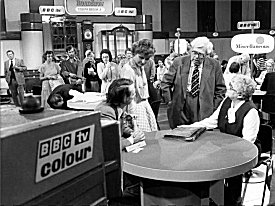 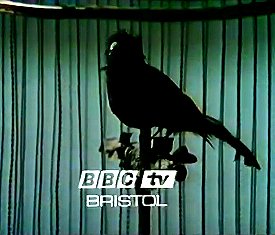
|
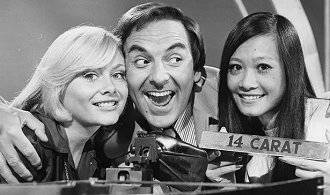 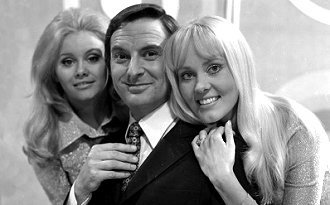
|
The
Golden Shot ATV produced 367 x 60-minute episodes of this interactive game show for ITV between 1st July 1967 and 13th April 1975. They were all transmitted in colour, except during the ITV 'colour strike' of 1970-71, when episodes 10 to 21 of series 3 were broadcast in black and white. This innovative, 'live' British television game show was based on the German TV show 'Der Goldene Schuß' created by Hannes and Werner Schmid. Hannes Schmid came over with the show and for the first 14 episodes was the man behind the crossbow. Known as 'Heinz' he was the subject of the earlier catchphrase 'Heinz - the bolt'. Subsequent loaders / operators of the crossbow were Derek Young, Alan Bailey and Johnny Baker - the 'Bernies' - giving rise to the catchphrase 'Bernie - the bolt', which has been remembered long after the end of this long-running programme. Based on crossbow archery, the 'tele-bow' was a crossbow attached to a television camera guided by a contestant who gave instructione to a blindfolded cameraman to fire a crossbow at targets to win the prizes being offered. The bow shot a bolt at an exploding target that was embedded in an apple positioned against a backdrop often created from Bob Monkhouse's own cartoons. Potential studio contestants would initially phone into the show from home and guide the cameraman to fire, and the four highest scorers would be invited to appear on the show the following week. In the studio the crossbow was again operated by a blindfolded 'Bernie' who received aiming instructions from a contestant who was viewing a screen in an isolation booth. The two contestants with the highest score would have a shootout, using joysticks to control the movement of the tele-bow, and the winner of that would then have the 'Bernie' target a treasure chest for the top prize of a hundred guineas, later increased to three hundred guineas. . The show is most commonly associated with host Bob Monkhouse, but three other presenters also fronted the show. Jackie Rae 1967, Bob Monkhouse 1967 – 1972, Norman Vaughan 1972 – 1973, Charlie Williams 1973 – 1974 and Bob Monkhouse again 1974 - 1975 plus Pete Murray who appeared a few times as a 'guest' presenter. The show also contained one or more (usually musical) entertainment performances by guest artists with many huge stars appearing on the show as well as comparatively little-known 'newcomers'. Game hostesses, known as 'The Golden Girls', included at various times, Anita Richardson, Andrea Lloyd, Carol Dilworth, Lee Patrick and Yutte Stensgaard. There was also the amazing 'dumb blonde' - Anne Aston - who figured out the scores achieved by the contestants but was supposedly unable to count without using her fingers. In later programmes there was also a 'Maid of the Month', usually a starlet or glamour model of the time, who would announce the contestants and demonstrate the prizes. When Bob Monkhouse returned to present the show for a second time in 1974 Anne Aston shared hostess responsibilities with 'Bond girl' Wei Wei Wong, which was apparently one of the earliest regular appearances by an East Asian woman on British television. |
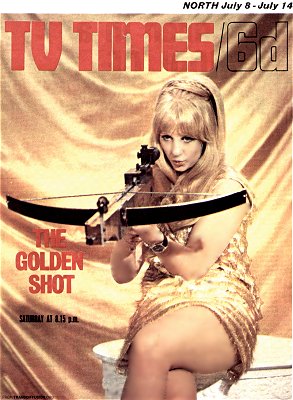 |
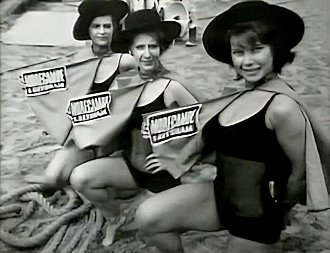 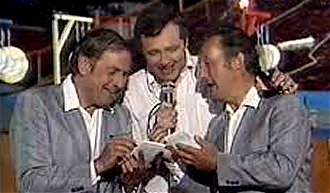
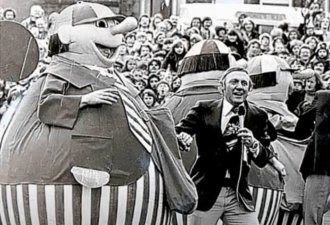
|
It's
A Knockout and
Jeux Sans Frontières Probably one of the most pointless but often hilarious shows ever made. The format is credited to Guy Lux and it was adapted from a French show called 'Intervilles'. The content for the British version was produced by Robin Scott as part of the international 'Jeux Sans Frontières' franchise. BBC Manchester produced 233 x 60-minute episodes of the UK version of the game between August 1966 and 29th October 1982 with some one-off 'specials' being made between 1970 and 1990. Later series were made by both S4C and Channel 5. At it’s peak in 1979, 'It’s A Knockout' was watched by over 15 million people in the UK. The theme music for the UK show was Bean Bag by Herb Alpert. The very first competition aired on 7th August 1966, resulting in a win for Blackpool over Morecambe. Early series were broadcast in black and white and were not without their problems - this very first episode was broadcast live and included a three-legged football match on the beach at Morecambe, which had to be abandoned because the tide came in. McDonald Hobley was the original presenter, a BBC veteran and one of its first continuity announcers as well as hosting the 'Coffee Break' show on the Radio London pirate station. He was variously assisted by Charlie Chester and Ted Ray, with Eddie Waring and Stuart Hall taking part as referees. The hosting for the second series in 1967 was billed as McDonald Hobley (Presenter) and David Vine (Master of Ceremonies). Katie Boyle replaced McDonald Hobley in 1968 and she, in turn, was replaced by the rugby commentator Eddie Waring, who was allegedly promoted to co-host along with David Vine when Katie walked out in the middle of a recording. Arthur Ellis, who was a former international football referee and one of the original members of the Pools Panel when it was set up in 1963, took over the mantle of referee in 1969. David Vine chose to leave the program in 1972 and it was Stuart Hall who agreed to carry on with the presentation of the show and is probably the personality most associated with the role. He brought with him a unique style of presentation. His irrepressible commentary on the proceedings frequently subsided into hysterical laughter at the competitors' buffoonery and meant that his intended running commentary was seldom delivered with Eddie having to talk us through the goings on in his broad Yorkshire accent.. This rather lunatic 'sporting' challenge game show involved amateur teams from various British towns or cities taking part in a variety of large scale field games to try and win a place in 'Jeux Sans Frontières', the international version. A perpetually laughing Stuart Hall and Eddie Waring attempted to describe and give commentary on brilliantly inventive games that contained bungee runs, greasy poles, gunge, water, foam, inflatable structures, turntables and huge silly costumes while other teams attempted to interfere with proceedings by squirting water cannons and throwing things like custard pies. Slightly less manic games included activities such as picking up eggs with an industrial excavator, and overcoming assault courses and various inflatable obstacles. The British programmes originally contained two teams competing 'head to head', later ones three, with the winners and runners up in each event scoring points,. Each team was given a 'joker' card, a large playing card style joker, which was presented before the start of any one game in which that team thought they had the best chance of winning, which doubled the points they scored in that game. Excluded from this was the 'marathon', an ongoing 'quickie' contest held between each main game, The winner of each contest was awarded a trophy and the chance to represent the UK in the international 'Jeux Sans Frontières' competition the following year. Only five UK episodes from the 1960s still exist in the BBC archives as of 2025: Cheltenham Spa vs. Worthing 1968, New Brighton vs. Blackpool 1968, Plymouth vs. Torbay 1968, Perth vs. Dundee 1968 and the 'Jeux Sans Frontières' international final 1968, mainly because the programmes were produced live and were not generally recorded or have been subsequently wiped. 'Jeux Sans Frontières' ('Games Without Borders') consisted of a series of international heats held in different countries who were part of the 'Eurovision' network. Up to 1970, when they were joined by The Netherlands, these were the UK, Belgium, France, West Germany, Italy and Switzerland. At the conclusion of all the heats, constructed on an extremely lavish scale, the top-scoring team from each country would be their representative in a grand final. Each show usually had a theme, with the games being based on that subject. The competition had started in 1965 but the UK did not compete until 1967, with the first representatives being Bridlington, who took on the other Europeans in France. France participated in the 1968 series but, due to industrial action in French television, they were unable to broadcast any of the series domestically and had to cancel hosting their international heat. West Germany hosted two heats that season in place of the French. No French teams participated in the 1969 series due to the ongoing strike action. Excluding the Christmas 'specials', The UK won the main title four times, with West Germany winning the most with 6 titles. The international competitions were hosted by a different country each week but always under the scrutiny of international arbiters Gennaro Olivieri and Guido Pancaldi, both Swiss ice hockey referees The host country supplied the main presenter of each show with the foreign language versions being over-dubbed by the British presenters. Stuart Hall and Eddie Waring provided the British commentary along with the multi-lingual Katie Boyle. The European version of the programme consisted of a range of different games with each team sitting out one apiece. Points were awarded in reverse to the position in each game, so the team coming last only scored 1 point, although playing the 'joker' on your best game gave teams a fighting chance of getting double points, but only if they finished in the first three in that game. The international version of the 'marathon' game was named the 'Fil Rouge' (Red Line). This was an on-going event during the competition and was a short game played by the omitted team between the main games. Points were awarded for this after all 'marathon' rounds had been completed. In this way we reached the end game with all teams having competed once in the 'marathon' and in all the other games but one and having used their 'joker'. There was often everything to play for hingeing on the final game. |
| Jokers
Wild 'Jokers Wild' was a 30-minute British comedy panel game made by Yorkshire Television for ITV and 169 episodes aired in 9 series from 9th July 1969 to 20th November 1974, mainly hosted by Barry Cryer with a few by Michael Bentine. An earlier pilot show had been produced in April 1969 but was never aired for whatever reason. There were also 2 'Christmas Specials' in 1972 and 1973. In early shows, Barry Cryer had two 'assistants' - Ann Coates and Louisa Rabaiotti but they were somewhat superfluous to proceedings and dropped after the first season. Team captains, at various times, were Ted Ray, Arthur Askey, Bob Monkhouse, Charlie Chester, Roy Hudd and Jimmy Edwards with many panel members, the main contributors being Les Dawson, Ray Martine, Clive Dunn, Ted Rogers, Lance Percival, Warren Mitchell, Norman Collier, Tim Brooke-Taylor, Rolf Harris, Alfred Marks, Chic Murray, Ray Cameron, Jon Pertwee, John Cleese, Sid James and Jack Douglas. Generally, the teams consisted of two 'regulars' and a guest comedian. Created by Ray Cameron and Mike King, the weekly show was based on two American panel game shows - 'Stop Me If You've Heard This One' and 'Can You Top This?'. Two teams of three comedians competed in trying to top each others jokes, playing for points by telling jokes on a certain subject chosen by the host, who would pull the selection from a box on his desk. During the telling of a joke a member of the other team could interrupt the joke by pressing the buzzer and finishing it to score bonus points for his/her team. However, that turn did not end until the comedian whose turn it was finished the joke with a punchline. In an interlude before the commercial break one of the comedians would be given one minute to score points by getting as many laughs as possible from the studio audience. The points scoring system was variable and questionable at best, but not really the main aim of the show. At the end of each show the winning team with the most points were presented with a trophy of a jester carrying the Yorkshire Television chevron logo. Juke Box Jury Created by Peter Potter and hosted by David Jacobs, this 30-minute BBC show started life on 1st June 1959 and ran until the end of 1967. Originally scheduled on Mondays, its instant popularity soon earned it a Saturday evening slot after the 'Grandstand' sports programme. The theme music most associated with the show is the catchy 'Hit and Miss', which was penned and performed by John Barry. See much more information and images of the show on the Sixties City 'Juke Box Jury' page. Mr & Mrs Created by Roy Ward Dickson and based on the Canadian show of the same title, Mr and Mrs was a 30-minute quiz game show made in different transmission areas and eventually networking on ITV in 1972. The show is unusual as it had versions being made by more than one ITV region. Alan Taylor hosted the first TWW version from 23rd February 1965, Derek Batey hosted the Border version and Norman Vaughan hosted a version made by Anglia. The first version, for TWW, began in 1964 and the Border version followed in 1967. The Anglia version ran across the whole ITV network for a year in 1969 but it was not until 1972 that the series was regularly networked, with hosts Derek Batey and Alan Taylor alternating weekly. The theme music for the Border show was composed by Tony Hatch and Jackie Trent and was released as a single in 1975. In 1976 it was the Border version that was transmitted nationally and this remained part of the daytime scheduling until 1988, each show ending with the advice 'Be nice to each other!'. It had actually been Tyne Tees who provided colour production facilities for Border in the early 1970s as Border had not previously upgraded to colour production. Couples on the show attempted to match their spouse's answers to six questions about their domestic and love life, switching roles after the first three questions, and attempted to predict how the other, who would be seated behind a window and wearing headphones, had answered those questions. Their winnings depended on how many times their answers matched. If any couple succeeded in successfully matching all six answers to the questions they would win the 'jackpot' prize which was variable as it increased by £10 each time a couple failed to answer all the questions correctly. Carriage clocks were also given away to competitors. |
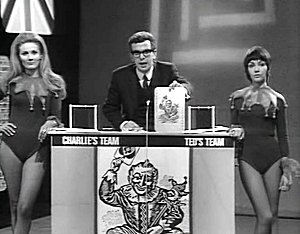
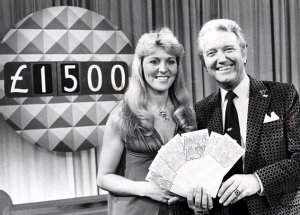
|
| Thank
Your Lucky Stars Probably the least well-remembered of the four 'classic' UK television pop shows of the Sixties, 'Thank Your Lucky Stars', first hit our screens on 1st April 1961 and spanned more than 250 episodes until the final episode of the regular programme, 'Goodbye Lucky Stars', that was presented by Jim Dale and broadcast on Saturday 25th June 1966. Produced by ABC Television, it was intended as a rival show to the BBC's already well-established 'Juke Box Jury'. The original presenter of the show was Keith Fordyce who went on to greater fame as compere of 'Ready Steady Go!'. Other presenters over the show's five-year life included Jimmy Savile, Pete Murray, Barry Alldis, Kent Walton (the well-known wrestling commentator who had previously compered 'Cool For Cats'), Alan Dell, Sam Costa, Jimmy Young, Don Moss, Muriel Young and Brian Matthew. It was Don Moss who was responsible for introducing 'Spin a Disc' to the show. This was the segment where a panel of 'typical teenagers' listened to the latest releases and awarded each of them 'marks out of five' in an obvious copy of the 'Juke Box Jury' format. Early in 1962 a 16 year-old girl from Wednesbury in the Black Country (then Staffordshire) was successful in her application to be on the teenage jury and she proved to be such a popular personality that she remained as a permanent feature on the jury for three years. The girl was Janice Nicholls and her 'Oi'll give it foive' spoken with a strong Black Country accent became a national catchphrase. The programme introduced an all-Liverpool 'special' on June 29th 1963 called 'Summer Spin Liverpool Special', featuring The Beatles, Lee Curtis, The Big Three, Kenneth Cope and The Breakaways, Billy J. Kramer and The Dakotas, The Vernon Girls and Gerry and The Pacemakers. This one programme alone pulled in 6 million viewers, which persuaded ABC to introduce a regular additional seasonal replacement programme called 'Lucky Stars Summer Spin' and also led to a second 'Merseybeat Special' on December 21st 1963 called 'Lucky Stars On Merseyside' which featured The Beatles, Gerry and The Pacemakers, Billy J. Kramer and The Dakotas, Cilla Black, Tommy Quickly, The Fourmost and The Breakaways. The 'Spin-a-Disc' segment of this particular show featured the Cavern Club's D.J. Bob Wooler as guest compere and Billy Butler as a mop-top teenage jury member. 'Spin-A-Disc' was replaced in July 1964 during the Summer Spin months by 'The Pop Shop'[ with Janice Nicholls becoming the DJ/counter assistant. See much more information and images of the show on the Sixties City 'Thank Your Lucky Stars' page. |
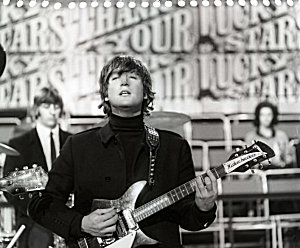 |
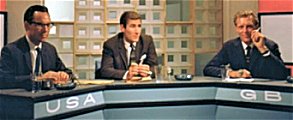  |
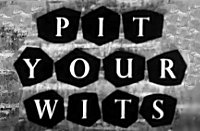 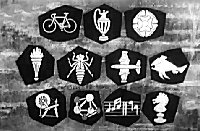
|
Needle
Match A black and white 30-minute Associated-Rediffusion panel game that first aired 17th July 1962, directed by John P. Hamilton. A short-lived 'Britain against America' game show, hosted by Keith Fordyce, in which the latest records were put up against each other. The show seemed to be one of ITV's answers, along with 'Thank Your Lucky Stars' to the BBC's 'Juke Box Jury', but with the addition of a Pan's People style dance troupe who performed to the records under review. Guests included David Gell, Wally Whyton, Don Moss, Oliver Reed, Jim Dale, Kenny Lynch, Ronnie Carroll, Peter Gordeno, Ray Conniff, Maureen Evans and Julie Grant with Drew Russell and Catherine Milinaire acting as 'judges'. All episodes of this programme are believed to have been lost. Password A 30-minute panel game show based on the US version of the same name. It originally aired on ITV from 12th March 1963 to 10th September 1963, hosted by Shaw Taylor. It was briefly revived by BBC2 from 24th March to 28th April 1973, hosted by Brian Redhead, and by BBC1 from 7th January 1974 to 3rd January 1976, first hosted by Eleanor Summerfield in 1974 and then by Esther Rantzen from 1975 to 1976. After a 'password' was created, the team in play had to decide whether to play or pass. Naming the password correctly scored 10 points, but 1 point was deducted for each clue received. Created by Bob Stewart, ATV produced 27 episodes and the BBC 39. It was subsequently briefly 'revived several times, with some minor changes to the original format - Channel 4 from 6th November 1982 to 14th May 1983, hosted by Tom O'Connor; Ulster TV from 2nd September 1985 to 13th March 1987, first hosted by Brian Munn in 1985 then by Gordon Burns from 1986 to 1987 and on ITV from 20th June to 29th July 1988, also hosted by Gordon Burns.The format of the game was identical to the US show where two teams compete against each other Pit Your Wits A BBC 1 quiz show, produced by John Irwin, that was hosted by Kenneth Kendall and Gwynneth Tighe that is thought to have aired from around August 1961 to September 1963 over 3 series. The show was described in the Radio Times as 'Pit your wits against the general knowledge and I.Q. questions put to you by the hosts'. Until fairly recently all episodes were assumed to be lost until two episodes of the show were found to exist in a foreign archive. |
|
Play Your Hunch Play Your Hunch was a US game show that aired from 1958 to 1963 and was a Mark Goodson-Bill Todman production. The BBC produced a 30-minute British version of the show that aired from 10th October 1961 and was hosted variously by Julie Alexander, Barry Craine and Jack Jackson, with Alan Freeman hosting at least one show. The format of the novelty quiz involved two pairs of people competing against each other to solve problems that provided a choice of three visible answers, sometimes people, that were labelled X, Y, and Z. Playing alternately, the teams had the choice to play or pass before the problem was presented to them. The team playing the problem discussed possible answers between themselves until a chime rang and they had to give an answer. If the team answered incorrectly their opponents had the choice between the remaining two answers. Problems were quite varied, some being visual observation tests with others more or less relying on a lucky guess.. Dad, You're A Square A Southern Television production that aired from 21st June 1963 to 13th May 1964 This was a show similar in concept to Juke Box Jury, described hopefully by Roy Rich as "a disc show with a difference". Hosted by DJ Barry Langford, a panel of six (three teenagers opposed by three 'square' adults) commented on a record, casting votes whether to 'buy' or 'break' the disc. If the latter vote was recorded, a machine instantly caused the unfortunate record to shatter by rolling a cannon ball into it. Directed by Angus Wright, the scheduled starting date was 13th June 1963, with the panel including 19 year old pop singer Garry Mills. However, a couple of test programmes were made before this. The first two series in 1963 were studio-based and networked to Tyne Tees, Border and Grampian. A third series in 1964 saw the show becoming an outside broadcast. The 26th February 1964 edition came from Salisbury, and featured Rosemary Squires. 29th April came from Petersfield Town Hall with Paddy Roberts (director Bill Perry) and on 6th May from Chatham Town Hall. A regular 'square' on the programme was Ken Chaplin who went on to manage pop group 'The Untamed'. Wendy Richards also appeared on the programme. Discwizz Another Southern Television show, this one commenced on June 24th 1964, compered by Muriel Young with Tony Hall and directed by Mike Mansfield. Questions were put to a panel of two teams, made up of three girls versus three boys, all aged between 15 and 25. Questions ranged from artists and composers to pop songs. The teams changed each week, the prize... some LP records. Pop The Question The title originally belonged to an ATV children's panel game in 1956, devised by Peter Ling and hosted by Eric Spear, that was described as 'a quiz race with questions, forfeits and prizes'.that was also based around music The 1965 show was produced by Southern Television and ran from 12th October 1965 to 7th June 1966 when it was replaced by 'Countdown'. Directed by Mike Mansfield, it was hosted by Muriel Young, with Shaw Taylor, and was recorded at the Winter Gardens, Margate. The first programme featured Dusty Springfield, Johnny Gustafson and Madeleine Bell, with theme music that was recorded by Tom Jones' group The Squires and released as a single by Decca on F.12226. In an interview with Beat Instrumental magazine in June 1966 Mansfield, who chose all the records for the show himself, said "We are restricted to a certain extent because ours is a panel programme. We have two teams of pop stars - three boys and three girls - discussing the records we play and we always play their own releases. We have an average of 16 records per programme and I choose them from the 40-odd we receive each week. There's every chance an unknown artist with a song by a newcomer could get his record played, and not just once either. If we particularly like a record we play it two or three times in consecutive weeks". |
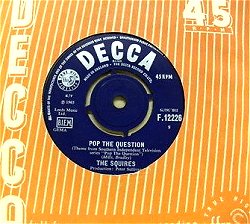  |
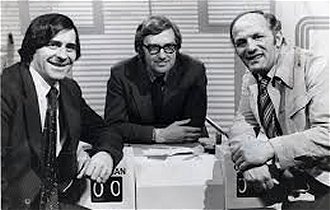 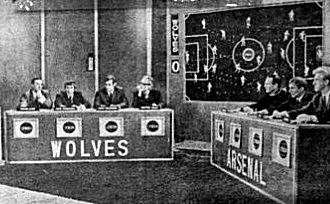 |
Countdown Countdown was Southern Television's most ambitious pop quiz to date, again hosted by Muriel Young, now assisted by DJ Don Wardell, and produced by Mike Mansfield. Two pilots were made in the spring of that year, before it was networked in the autumn schedules. The show was taped on a Tuesday and screened on the following Saturday, at different times depending on the region - 4pm Southern and Border, 11.45pm ATV London and TWW. The TV Times described it as 'A chartbusting panel show in which top popsters compete to test their knowledge of the current disc scene and sing for their supper'. It ran for 13 episodes from 1st October 1966 to 24th December 1966, the first show featuring Dave Dee Dozy Beaky Mick and Tich, Sandie Shaw, Lulu, Adam Faith, Simon Dee and either Hayley Mills or Jean Shrimpton. A Question of Sport Created by Nick Hunter, this 30-minute British television sports quiz show produced and broadcast by the BBC is probably the world's longest running TV sports quiz. Following a pilot episode presented by Stuart Hall in December 1968 that was only broadcast in the north of England, the first series was broadcast nationally from 5th January 1970, with David Vine at the helm for the first five series. On the first show he was joined by captains Henry Cooper and Cliff Morgan leading teams of three, composed of George Best, Lillian Board, Tom Finney and Ray Illingworth. The series ran (except in 1973 and 1978) until production ceased in 2023, but has since been reinstated. Earlier series presenters have been David Vine 1970 – 1972, 1974 – 1977 and 1989, David Coleman 1979 – 1997, Sue Barker 1997 – 2021 and regular past team captains have been Cliff Morgan 1968 – 1975, Henry Cooper 1968 – 1979, Fred Trueman 1976 – 77, Brendan Foster 1977 – 1979, Emlyn Hughes 1979 – 1981, 1984 – 1988, Gareth Edwards 1979 – 1981 with early 'guest' captains including Bobby Moore 1968, 1970, 1972 and 1974, Johnny Haynes 1970, Bobby Charlton 1972 and 1974 – 1975, Mary Peters 1976 and Alan Pascoe 1976. The show included many rounds that, over the years, have included the 'Picture Board' where 12 numbered squares revealing a sportsperson had to be identified in 60 seconds, the 'One Minute' round, answer 9 questions in 60 seconds, the 'Observation' round where three questions were asked after the team had been shown a sports clip or montage, the 'Mystery Guest' round where the team tries to identify a sportsperson, sometimes disguised, in unfamiliar circumstances or from unconventional camera angles, the 'Home or Away' round which was a round for individual contestants who could choose between a one-point 'home' question on their own sport or an 'away' question worth two points that could be on any sport. The earlier programmes always ended with an 'On The Buzzer' round, teams playing head-to-head to answer 60 seconds of quick-fire questions. Quizball Created by George Woolly, this was a 30-minute BBC general knowledge quiz between two teams of 4 who had to answer questions in order to advance along a board in the form of a large electronic football pitch in order to 'score' in the opponents' goal. The series was held on a F.A. Cup-style knockout basis. The teams each represented a well-known football club and contained 3 members or players from that football club plus a celebrity guest who allegedly supported that team. The questions ranged in difficulty from 1 (hard) to 4 (easy), the correct answer to which would move that team a certain number of places towards the opponents' goal, probably giving rise to the expression 'route 1 football'. At a critical point a team could play a 'tackle' question, the correct answer giving them possession but a wrong answer conceded a goal. The first programme came from Hornsey town hall and featured 'Arsenal versus Nottingham Forest' with Arsenal being represented by Ian Ure, Terry Neill and Bertie Mee with Jimmy Young as their celebrity. Nottingham Forest were represented by Bobby McKinlay, John Barnwell and John Carey with Ted Moult as their celebrity. Produced by Bill Wright and directed by Philip Gilbert, the theme music was written by Tony Hatch and questions devised by James Lloyd. The voiced introduction was by John Witty. The show was originally hosted by David Vine, with Barry Davies 1970 and then Stuart Hall taking over in later series. 72 episodes were made over 6 series between 22nd December 1966 and 23rd December 1972 but only six episodes have survived the BBC's wiping practices. |
|
Sing A Song of Sixpence A shorty-lived Rediffusion production of 14 x 30-minute episodes that was originally scheduled to debut on Thursday 13th May 1965, but was replaced by the Dickie Henderson and eventually aired from 18th June 1965 to 10th September 1965 as a summer replacement for Take Your Pick featuring teams and consisted of celebrities and 'public' contestants testing their knowledge of song lyrics. It was hosted by Ronan O' Casey and co-hosted by Ready Steady Go's Annie Nightingale. Edited by Ruth Phillips and directed by Peter Yolland, the music was provided by pianist Ronnie Cass and his band The Six Penn'orth. In an interview for the TV Times he spoke about about the huge number of tunes that they would have to learn and said "We can do it so quickly now that I'm half afraid the public will say that it's faked! Well, it isn't! These boys can play about 3,000 songs, more or less straight off. When we first got the selected 500, we did a 12-hour band call. Straight through. Played the lot". The contestant from the general public was teamed up with one of that week's celebrities and would put sixpence into a computer-like machine that selected one of five hundred songs at random for which the contestant then had to sing the first two lines to win a prize. Potential contestants were apparently asked to suggest the names of celebrities, but not from the music world, that could also participate. According to the Daily Mirror 'The prize for each correct line sung is £5 and it's possible, say Rediffusion, for one contestant to win more than £150'. Disc Weekly also commented on the new Rediffusion quiz show which required that the contestants have 'an above average knowledge of lyrics of standard ballads'. Sixth Form Challenge This partially networked show by Granada for ITV ran from 15th June 1966 to 20th September 1967. The 27 x 30-minute black and white episodes in 2 series began as a summer replacement for 'University Challenge' and was billed as 'The University Challenge contestants of tomorrow take over the studio bells and buzzers in this new version of ITV's test of quick wits and general knowledge'. The show was devised by Don Reid, produced by Douglas Terry and directed by Peter Mullings with host Chris Kelly asking the questions. In the first season each school only competed in one programme and there were no finals. The second season saw it become a knockout competiton. In 1968 there was no 'summer break' for 'University Challenge' so the show was discontinued. Spot The Tune This was a British television game show, broadcast live and made by Granada for ITV. It consisted of 209 x 30-minute episodes which aired from 7th June 1956 to 7th September 1962 on ITV. In August 1956 it became ITV's first show to attract one million home views. Most episodes of this series are believed to be lost with only five known to survive. The show was a music quiz in which the contestants had to guess the title of a song within a certain time after hearing only a small sample of it, usually sung by resident vocalist Marion Ryan. The host would be with the contestant and sometimes help out by scribbling clues. It was very similar in practice to the US series 'Name That Tune', a name that would be used for it when the show was revived by Thames Television in 1970, hosted by Tom O'Connor. The first host was Ken Platt who was replaced in 1958 by Des O'Connor. Subsequent hosts included Ann Taylor, Alfred Marks, Jackie Ray, Ted Ray, Billy Raymond and Pete Murray. Music for the show was provided, at various time, by the Bob Sharples Orchestra, the Peter Knight Orchestra, the Alyn Ainsworth Orchestra and Johnnie Gray and his Band of the Day. The resident vocalist for the entire run was Marion Ryan who released a 7" 33rpm LP record titled 'Spot The Tune' on the Bell Toys And Games Limited label, number 14543. In an interview with the TV Times in late 1957 she said "It's been very exciting and exacting. I became the first girl to have a bath on TV in this country. I've also sung a number cramped in a mermaid's tail. We are always trying out something new". Take A Letter Granada made 128 - 130 episodes of this 30-minute black and white show that aired from 10th January 1962 to 24th June 1964. Created by David Housham, it was a crossword-based game show, produced by John Hamp, in which contestants were given a verbal clue by the host that led to a letter which, when added to others that had been 'won', led to a word being spelled out. Whoever got the word or phrase the quickest won the prize. In those days, the original maximum prize that could be won was only about £34. Apparently, in earlier shows, there was a viewers' question set each week for a £5 prize. In one particular week 980,000 entries were received. The show was hosted by Bob (billed as 'Robert' at that time) Holness who had landed the job not long after arriving in Britain from South Africa. His work history was in radio, and the theatre, but he was a complete newcomer to television which turned to his advantage, as he once revealed in an interview, as the producers decided they wanted a host who hadn't been seen on TV before. |
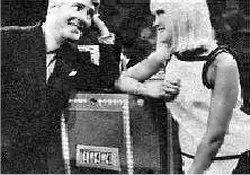 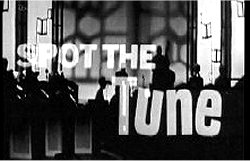 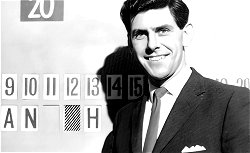
|
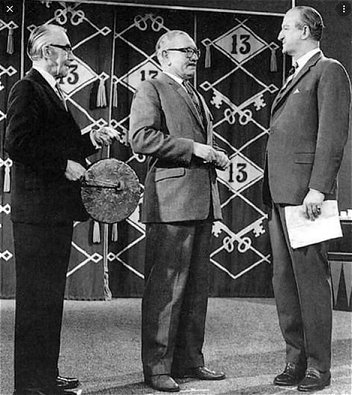 |
Take
Your Pick 494 episodes of this hugely successful 30-minute show were made by Associated-Rediffusion (later Rediffusion London), produced by Audrey Starrett, which aired from 23rd September 1955 to 26th July 1968 and was the first UK game show to offer cash prizes. Both created and presented by 'quiz inquisitor' Michael Miles, he was assisted by 'the gong man' Alec Dane with Harold Smart providing interlude music on the organ and the voice announcements of Bob Danvers-Walker, who was also the voice of Pathé News from 1940 to 1970. 'Take Your Pick' was originally a radio show broadcast by Radio Luxembourg starting in 1952 and the television version appeared on the box one day after the launch of ITV. The show would commence with a contestant chosen from the audience. In the second series, hostess Elisabeth Kingdom brought them onto the 'stage' where, after a short interview, they had to survive 'the yes/no interlude' - a minute of fast-paced questioning from Michael Miles - without using the words 'yes' or 'no' in their answers. Neither would they be allowed to nod or shake their heads excessively. If they did utter the words 'yes' or 'no' in answering a question, they would be 'gonged' off the stage. The 'survivors' would then have to answer additional general knowledge questions correctly in order to win a key to a numbered prize box of their choice. Michael Miles would then proceed to try and buy the key back from them by offering increasing sums of money that could at times total as much as £20. It was the contestant's choice whether to accept his offer at any stage with the audience shouting advice as to whether to 'take the money' or 'open the box'. One of the keys would also give the contestant the choice of whether to keep their prizes or take a chance on opening 'Box 13', which could possibly contain anything from the weekly 'star prize' that may have been a holiday or something fairly substantial for the home, but could also contain a 'booby' prize of an item with little or no value, such as a mousetrap. Thames Television revived the format between 1992 and 1998, hosted by Des O'Connor. Tell The Truth The 30-minute show was a panel game based on the US version 'To Tell the Truth'. ATV (credited as 'ATV by arrangement with Goodson and Todman and CBS') made 76 black and white episodes in 3 series for ITV between 17th September 1957 and 6th September 1961 but sadly none of those episodes have survived. The UK show was created by Bob Stewart and produced by Rita Gillespie. It was first hosted by David Jacobs with McDonald Hobley taking over from July 1958 and finally Shaw Taylor who took over as host from 1959 to 1961. The format of the show consisted of a panel of four celebrities who had to guess which one of the three 'unknown' people they were faced with was telling the truth about something the host announced about them. The two 'imposters' also claimed to share that secret too so the celebrities had to try to work out who the 'real' one was. This was attempted by each of the celebrities in turn asking questions of the three people. They each got 30 seconds to question whoever they liked in the line-up, most usually one or two for each of the three people. Only the 'real' person had to tell the truth throughout - the 'imposters' being allowed to lie through their teeth to put the celebrities off the scent. After the question session each of the panel had to nominate who they thought was telling the truth, followed by the big reveal - 'Can the real ***** please stand up', at which point there was usually a shuffling and pretending to rise before the 'real' person about who the fact was true revealed themself, after which the identities of the 'imposters' was revealed and the host held a short interview with the 'real' person. |
| Three
Little Words 80 episodes of this 30-minute game show were originally produced by TWW, then HTV from 1975, and aired periodically from 4th July 1967 to 16th December 1986 but was not networked until 1975. It was created by Roy Ward Dickson, who invented many TV game shows, and presented at various times by John Edmunds, Don Moss with co-hosts actress Linda Hayden and Sue Anne Snook, Alan Taylor and, in the 80s revival, Ray Alan with his wife 'Barbie' (Hayes) as co-host. This was a word association game for members of the general public where the object was to get your partner to say a particular 'mystery' word by giving them single word clues, but words that rhymed were not allowed to be used. 20 points were awarded for a word solved on the first clue, 15 points for a word solved on the second and 10 points if solved on the third attempt. If no correct answer was given after three clues, the opponents had the opportunity to guess the word for a 5 point bonus. The money winners were the pair with the higher score after a certain number of roundswords and they could continue accumulating prize money against other pairs up to six times before having to retire. Top Town This 50-minute show began life as a BBC radio series in 1950. It was an inter-town competition although differing from 'It’s A Knockout', with which it was often compared, in that it was essentially a talent contest with the town with the best acts winning the contest. It ran on BBC television from 4th February 1954 to 10th December 1956, then again on the BBC as 'Top Town Tournament' from 22nd January 1959 to 23rd June 1960. The number of episodes in these early series is unknown. It was revived in 1987 by BBC2 North West for 8 episodes. The show was presented at various times by Peter Haigh, Peter West and David Jacobs, with teams being given half the programme each to convince the panel of judges that they contained the best acts. The panel of 3 judges, consisting of viewers representatives, industry professionals and 'guest' judges, were not seen until the end of the show when they would give their verdict. In later programmes there was a slightly different scoring system where each act was awarded points out of five with the town accumulating the highest points total being declared the winners. Music was provided by the BBC Northern Variety Orchestra conducted by Alyn Ainsworth. Twenty Questions A celebrity panel game from a radio show first broadcast by the BBC in February 1947. The BBC made two 'one-off' TV shows in 1947 and 1948 but it was not regularly televised until the BBC made one series of 18 episodes that ran from 1st December 1956 to 30th March 1957. Associated-Rediffusion picked up the show and made 23 x 30-minute episodes in 2 series for ITV that ran from 17th June 1960 to 5th September 1961, hosted by Peter Jones. It was an 'animal, vegetable or mineral?' type of show where a celebrity panel tried to identify a 'mystery object' by asking the host a maximum of twenty questions that could only be answered with a 'yes' or 'no'. The 'object' in questio could be anything from 'The Complete Works of Shakespeare' to 'awooden spoon'. There was also a 'mystery voice' round where the panel had to guess the identity of a hidden celebrity guest. Regular panellists taking part in the game included Isobel Barnett, Frankie Howerd and Muriel Young. |
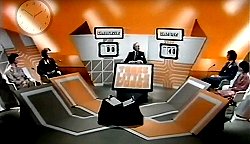 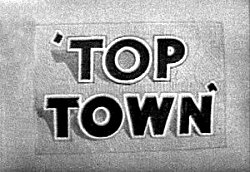 |
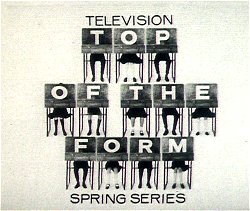 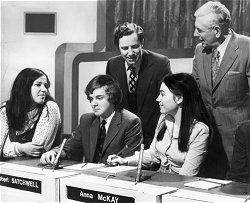 |
Television
Top Of The Form This long-running 'Nation wide General Knowledge Contest Between Schools' began on 1st May 1948, as a radio series on the Light Programme, later Radio 4, where it finally came to an end in December 1986 after a run of 38 years. The programme was first aired on television in two separate single shows the first of which, on 25th April 1953, featured Marylebone Grammar School, a boys team versus Sheffield High School, a girls team. A second show was broadcast in 1954 with the competition being between Lady Margaret High School for Girls, Cardiff, and Solihull School for Boys. It was not introduced as a series of 30-minute programmes until 12th Novemnber 1962 where it was called 'Television Top Of The Form' to distinguish it from the radio version that was still running. The television version survived until 9th August 1975. Early on, only teams from grammar schools seemed to take part but this changed as comprehensive schools became far more commonplace during the Harold Wilson government to the point where the 1967 featured only comprehensive schools. Each competing school fielded a team of four pupils ages ranging from under 13 to under 18, with teams from co-educational schools usually containing two girls and two boys. In the initial shows the teams from each school that week were questioned and filmed in their own school and did not actually face each other, therefore there were two 'question masters' as can be seen in the theme and opening credits shown here where the question masters were Geoffrey Wheeler and David Dimbleby. The original opening theme, which became strongly associated with the show, was a tune called 'Marching Strings', the composition of which is credited to 'Marshall Ross', a pen name of Austrian composer and orchestra leader Ray Martin. The questions were set by Boswell Taylor assisted by the BBC's Mary Craig who was also the scorer and electronic score board operator. For appropriate questions to be set, the contestants from each school filled in a questionnaire that asked about their interests, books read and favourite music. Host and Question Master Geoffrey Wheeler had been with the television series from the beginning, but became the sole presenter in 1970. Up to that time the shows had been co-presented, usually with David Dimbleby although other Question Masters of the television shows were John Dunn, Paddy Feeny and John Edmunds who later became a newsreader. Between 1967 and 1973 the UK took on Australian schools in a 'Transworld Top of the Form' edition that was renamed 'Transworld Top Team' in subsequent years when teams from the UK took on teams from other countries such as Canada, The Netherlands, the USA and Hong Kong. These 'Top Team' series consisted of 3 teams from each country all playing each other to establish a 'league champion'. A tenth show followed that was an 'all stars' game. These international shows were originally constructed by playing the game 'live' in sound only, with contestants being visually recorded in each country and assembling the programmes from these two elements later.This version of the show continued until 1973, with teams from Canada, Hong Kong and the United States taking part.
|
|
University Challenge This highly celebrated and cerebral 30-minute quiz competition was first broadcast by Granada on ITV at 10.45pm on Friday September 21st 1962 and was a contest between the the universities of Reading and Leeds. It was originally based on a US show called 'College Bowl', devised by Don Reid, that Cecil Bernstein, the brother of Sidney Bernstein who founded Granada Television in 1954, had seen and it was decided that Granada would produce something similar teams from UK universities competing against each other. Granada broadcast 913 episodes of the show on ITV between that date and 31st December 1987 hosted by author, playwright and theatre critic Bamber Gascoigne who continued as quizmaster for the next 25 years. It was one of the very few ITV programmes that was transmitted without any interruptions for advertising. The early series was produced by Barrie Heads and directed by Peter Plummer as director, replaced respectively by Douglas Terry and Peter Mullings in the mid 1960s. Each season, the show was held on a 'knockout' basis between 28 teams from various universities. The 14 first round winners advanced automatically to the second round. The four highest scoring losers from the first round played single knockout games to decide which team was going to join them in the second round. From that point onward, the competition was a straight knockout elimination, down to a winner. The teams consisted of four members who represented, in most cases, a single university. Exceptions to this were the individual colleges of the Universities of Oxford, Cambridge, London and Wales who all entered independent teams. During the show, 'your starter for ten' was on an individual buzzer with no conferring allowed. A correct answer was followed by a further 3 questions to that team, on a given subject, for 5 points each with conferring permitted. An incorrect answer, if the question was interrupted 'on the buzzer' resulted in the loss of 5 points therefore it was quite possible for a team to commence the show with 'minus' points. In television presentation it the two teams appeared to be positioned on top of each other during the 'starter' question although this was, for the time, a neat piece of camera trickery with a 'split screen', a technique that was used until the series at the end of the 'Bamber Gascoigne' period actually had a two-tiered set. The 'split screen' was reinstated for the revived series in 1994 and has been used ever since. Only 3 people have ever hosted the show. It was presented by Bamber Gascoigne up to its demise in 1987. Jeremy Paxman hosted the revival of the show on 21st September 1994, the programme's 32nd anniversary. He held the position until he gave it up at the end of the 52nd series in 2023, since which time Amol Rajan has been the questionmaster. Bamber Gascoigne died of pneumonia in 2022. There were similarly long-serving voice-over announcers as well. We heard the voice of Don Murray-Henderson from 1962 until his death in 1971. Jim Pope took over and continued until his death in 2001, after which Roger Tilling continued in the role. The revived show was not shown on ITV - it was curiously a co-production between Granada and the BBC and broadcasting continued on BBC2. The theme music for 1962 - 1963 was 'Ting A Ling', written by Charlie Shavers and Louis Bellson, and performed by Duke Ellington. For the rest of the series it was replaced by the now well-known 'College Boy' by Derek New. It was used at the start of the 'revival' series but has since undergone new arrangements since 1995.
|
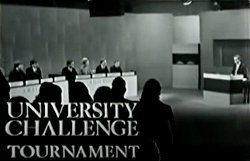 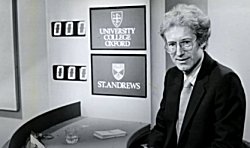 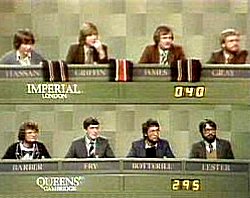 |
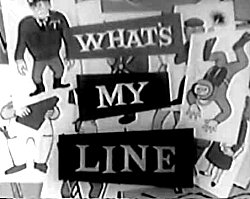 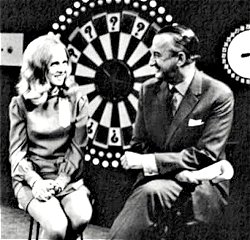
|
What's
My Line? Another popular long-running quiz show, created by Mark Goodson and Bill Todman, which has been 'revived' on UK television several times. It was the first US 'import' , based on the US panel show of the same name, and was also the UK's first successful non-quiz game show. The original UK series was produced by the BBC who made 413 x 30-minute episodes of the show that aired from 16th July 1951 to 13th May 1963, hosted by Eamonn Andrews, then on BBC2 from 23rd August 1973 to 25th May 1974, hosted by David Jacobs. A further 'revival' was produced by ITV from 26th March 1984 to 31st August 1990, hosted by Eamonn Andrews from 1984 until his death in 1987, then by Penelope Keith for a part of 1988 before Angela Rippon took over the hosting until 1990. Two regional ITV stations, Meridian and HTV, also 'revived' it again from 19th September 1994 to 17th December 1996, hosted by Emma Forbes. In this celebrity panel game, contestants with unusual occupations 'sign in' with their name then proceed to perform a short mime of the job that they do for the benefit of four celebrity panellists. In the original series, regular panellists appearing were Jerry Desmonde, Gilbert Harding, David Nixon, Barbara Kelly and Isobel Barnett. The celebrities, in turn, fired questions at the contestant that could only be answered with a 'yes' or 'no' to try and uncover the contestant's occupation. If the answer to the question was 'no', the questioning would pass on to the next celebrity in line. Ten questions eliciting a 'no' answer gave the contestant victory over the panel and they were awarded a certificate. There was little or no skill required from the contestant, only the fact that they had a very unusual or wacky occupation. At some point in the show, between competitors, the panel would be asked to don blindfolds and a 'celebrity guest' would appear, whose identity the panel tried to identify with their questions, often receiving the answers in disguised or comic voice so as not to give the game away too quickly. Originally, it was intended that Eamonn Andrews and Gilbert Harding were to host the show in rotation, but following a mishap on Harding's first show Eamonn Andrews continued as the full-time host. Harding did return to the show, but as a fairly regular panellist until his death in November 1960. There is an interesting story regarding Lady Isobel Barnett, who apparently had an amazing 'lucky streak' of getting the answers right. It seems that when Bob Monkhouse sat in her chair one week, he discovered that he could see a reflection in the window of the card shown to the audience that had the answer on it! Parisian Mode, written in 1951 by Woolf Phillips, became the signature tune of 'What’s My Line?' even though very little of it actually got heard. Nearly all of the original BBC1 shows have been wiped from the archives with only 7 of them surviving. Wheel of Fortune After the highly succesful 'Take Your Pick' series that ended when Associated-Rediffusion were forced to become Thames Television, Michael Miles went on to host this 30-minute game show for Southern Television where he was again assisted by announcer Bob Danvers-Walker and organist Harold Smart. The show involved members of the audience being invited to a 'yes / no' interlude similar to the 'Take Your Pick' format, with winners given the choice of 'taking the money' or chancing a spin of the giant wheel to win more exciting prizes or cash. It was one of the first colour productions by Southern who made 53 episodes in 2 series for ITV from 20th September 1969 to 8th January 1971. Michael was in talks for a new Southern TV show when he died on 7th February 1971 in Malaga, Spain, of a suspected heart attack aged just 51. The director of the original show was Peter Croft. The producer was Stephen Leahy with production design by Gregory Lawson. Scottish TV also had a go at the series in 1988 with Nicky Campbell hosting, assisted by Carol Smillie until 1994, subsequently followed by a variety of hosts and assistants, but this show was in a somewhat different format to the original series. Who-Dun-It 13 x 60-minute shows of this 'Cluedo' type mystery game programme were made by ATV and broadcast from 19th August 1969. Created by Lewis Greifer and produced by Jack Williams, this was an 'audience participation' show where viewers were invited to name the 'guilty party' before the final credits. Hosted by, and starring, fictional detective Inspector Jeremy Moon played by Gary Raymond, the Agatha Christie-style mysteries were set in the 1930s. After the discovery of a murder victim each week Inspector Moon would begin his investigations. There was a pause at the end of the second act where the viewing audience were invited to try and guess 'who-dun-it' before the culprit was finally revealed. This anthology of detective comedy/dramas included such notable actors as Brigit Forsyth, Derek Fowlds, William Russell, Madeline Smith, Joan Hickson, Eric Barker, Philip Stone, Trisha (Patsy Ann) Noble, Tony Hatch composed the series theme music. |
| Get
It, Got It, Good This was a BBC children's game show, devised by Britt Allcroft, 9 x 30-minute episodes that ran from 27th July to 21st September 1967. Nicky Henson, Jo Kendall, Kenny Lynch and Christopher Wray took part. No other details available. The Moon Clue Game A BBC 'race through space' children's quiz show devised and presented by Britt Allcroft, with Brian Cant as a referee. Teams with celebrity captains were pitted against each other. Captains included Terry Scott (The Taurans), Hugh Lloyd (The Capricorns), Kenneth Connor (The Scorpions), Billy Boyle (The Pisceans). The show was designed by Don Taylor. All the members of each team were born under the same astrological sign. The Radio Times describes the show as being divided into five rounds, a mixture of general knowledge and sketches, with the team winning the most rounds winning the contest. It ran for 8 x 30-minute programmes from 10th July 1968 to 28th August 1968. The electronic theme music was created by Delia Derbyshire. Music Match The fore-runner to this long-running 30-minute music quiz was a short-lived show produced by Anglia in 1960 called 'Disc Quiz'. Peter Fenn, best remembered later as the organist in Anglia's biggest quiz, the 1970s Sale of the Century, provided the music for a 'name that tune' show where people were asked to name a song after only two notes. It started on 9th January 1963 at 9.45pm with hosts Pete Murray and Muriel Young. "Contestants will be able to win up to £100 in this quiz show". They had to guess the twenty tunes Peter Fenn played, often heavily disguised. That top prize was not won until 1964 (by an American airman's wife) yet in 1965 the top prize was still a mere £100. David Gell hosted the show from October 1965. Dick Graham was the unseen announcer. Guest artists appeared each week, including The Honeycombs (October 1965), Carol Deene (24th November 1965). The show was revived briefly in October 1970 to the end of the year with Pete Murray as host. Peter Joy, who produced the original version, was now back and introduced a cabaret spot in each show. Carol Dilworth and Jennifer Cresswell were Murray's assistants. |
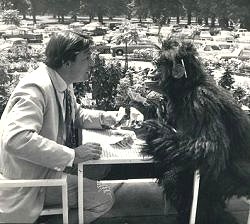 |
| TV
Talks by Jeff Evans Journalist, author, beer expert and pop culture historian Jeff Evans is a freelance journalist and author with more than 30 years’ experience in writing – and talking – about beer and pop culture. Jeff presents a number of fascinating, informative and fun talks about the history of television, particularly 'Pop On The Box', 'The Questionable History of the TV Quiz Show', 'They Think It's All Over! A History of Sport on TV' and 'The Golden Age of Children's Television'. For further information about his books and/or to arrange one of his fully illustrated 50 - 60 minute talks for your club, group or society, please contact Jeff via his site, linked here. |
|
|
All
Original Material Copyright SixtiesCity
Other individual owner copyrights may apply to Photographic Images |